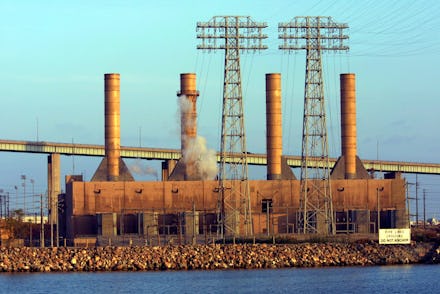Pollution is responsible for one in eight deaths in Europe, per a damning new report

Efforts to protect the environment are often framed as attempts to save the planet, but they are also attempts to save ourselves. As greenhouse gas emissions continue to rise and the conditions of the atmosphere worsens, more and more humans are being hurt by the harmful materials in our air and water. According to a study conducted by the European Union's Environment Agency (EEA) published Tuesday, as many as one in every eight deaths across Europe can now be linked to pollution.
The analysis looked at deaths across the continent in 2012, the latest year for which data is available. Researchers found that 630,000 people, accounting for over 13 percent of all premature fatalities in the region, could be attributed to environmental conditions. That means that with more regulation, care, and effort to move away from dirty-burning, pollution-heavy fossil fuels, those lives likely could have been saved. Air pollution was responsible for the largest portion of lives lost, contributing to more than 400,000 premature deaths. Extreme weather, particularly heat waves, were the next most deadly, killing an estimated 130,000 per year. Leading causes of death included cancers, cardiovascular diseases, stroke, chronic obstructive pulmonary disease, mental, behavioral and neurological disorders, diabetes, kidney disease, and asthma.
As is often the case, low-income areas were the hardest hit. "Poorer people are disproportionately exposed to air pollution and extreme weather, including heatwaves and extreme cold," the researchers wrote. They acknowledged that this difference often has to do with the fact that lower-income communities are exposed to more pollution, with power plants built closer to their neighborhoods. Likewise, many people living in low-income communities are exposed to more pollution from traffic, as they often live in densely populated cities.
The researchers also found that these pollution-based deaths are not evenly spread across Europe. Instead, the majority of the additional environmental burden seems to be carried by Eastern European nations. Norway and Iceland, two rich and predominantly white countries, saw just nine percent of total deaths within their borders attributed to environmental factors. However, in Bosnia and Herzegovina, a country with a high level of poverty and more diverse population, as many as 27 percent of premature deaths were related to exposure to pollution and extreme weather.
This is similar to the disparities found in the United States, where low-income communities and communities of color are disproportionately affected by pollution, the result of systemic racism's role in how cities are structured. These disaffected communities are often located closer to sources of pollution, including waste sites and energy plants. That results in exposure to worse air quality, which leads to myriad health problems. Likewise, the way many cities are built results in a severe lack of green space and trees that would typically combat some pollution and extreme heat. Instead, these communities are exposed to more concrete and asphalt, which absorb heat and create urban heat islands that are significantly hotter than surrounding areas.
If there is any good news to be found in the EEA report, it is that conditions appear to be improving, at least in Europe. The report found that air pollution could be linked to as many as one million deaths in 1990, so those deaths saw a nearly 60 percent reduction over the course of the last two decades. Researchers also found that water quality has been improving in the region and is less of a threat to the health of citizens across the EU.
While things might be trending in the right direction for Europe, it'll take a global effort to combat the number of deaths associated with environmental conditions. Air pollution is still on the rise elsewhere in the world, including in the US, and extreme heat is projected to get as much as 30 times worse by the end of the century. If the world fails to act as one in order to address climate change, scientists believe that pollution and rising global temperatures will kill more people than all infectious diseases combined in the coming decades.